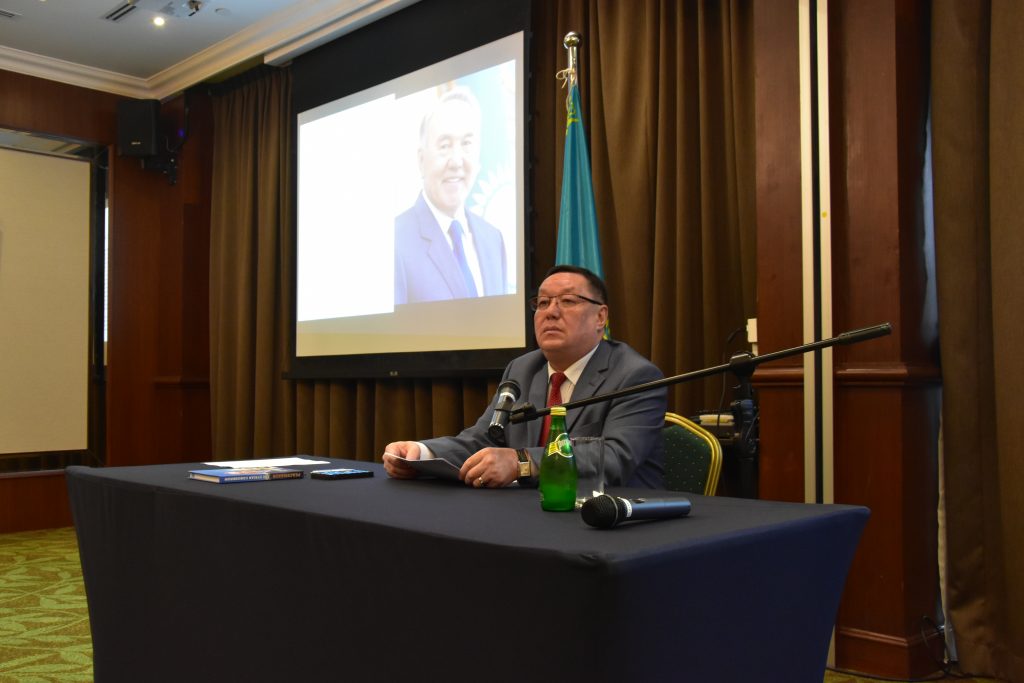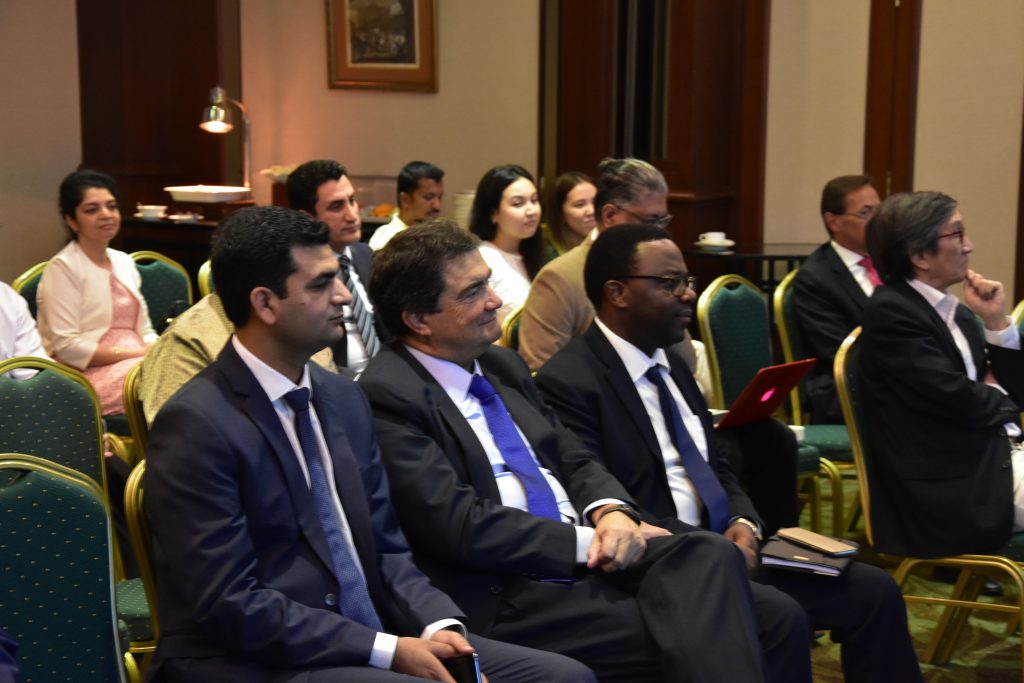 Speech by His Excellency Dr. Usen A. Suleimen, Ambassador of Kazakhstan to Singapore and New Zealand, on the State of the Nation Address of President of the Republic of Kazakhstan Nursultan Nazarbayev – “Growing Welfare of Kazakh Citizens: Increase in income and Quality of Life” – at the Tanglin Club on15 November:
Speech by His Excellency Dr. Usen A. Suleimen, Ambassador of Kazakhstan to Singapore and New Zealand, on the State of the Nation Address of President of the Republic of Kazakhstan Nursultan Nazarbayev – “Growing Welfare of Kazakh Citizens: Increase in income and Quality of Life” – at the Tanglin Club on15 November:
It is an honour for me to deliver this speech today on Summaries of the State of the Nation Address of President of the Republic of Kazakhstan Nursultan Nazarbayev – “Growing Welfare of Kazakh Citizens: Increase in income and Quality of Life”, which was delivered on October 5.
I hope that many of you have some knowledge about Kazakhstan, and I believe you will enjoy this meeting and find it interesting in shaping your knowledge of Kazakhstan, its economic potential, strategic programmes of development, foreign policy objectives and achievements, international initiatives and prospects of the relationships with Singapore, mentioned in current state of Nation, which determines what the country has to do for the successful navigation and adaptation within the Fourth Industrial Revolution.
The new address is based on a strategic goal – to join the club of 30 developed countries of the world by 2050. In this regard the main aim is creating a new model of economic growth ensuring Kazakhstan’s global competitiveness and further increase quality of life.
The growing welfare of Kazakh citizens is the highest priority for the Government. The Government will review priorities of budget expenditures, focusing on the social sector, security and infrastructure. The financial value of the initiatives will be over 1.5 trillion tenge (more than US$4 billion).
In this regard President Nazarbayev outlines 6 top priorities:
 GROWING INCOME OF THE POPULATION
GROWING INCOME OF THE POPULATION
This priority focuses on the Business Road Map – 2010-2020. Programme will be extended till
- In three years this will allow additional creation of at least 22,000 new jobs, ensure 224 billion tenge of taxes and production of goods for an amount of 3 trillion tenge.
- Decisive measures to develop economic competition and get utilities tariffs and natural monopolies under control. The anti-monopoly agency to be reformed and significantly strengthened with functions for competition protection.
- Enhancement of protection of business from unlawful administrative pressure and criminal prosecution threats. The threshold of criminal liability will be raised from January 1, 2019, administration of tax and customs should be made more transparent, tax amnesty for SMEs will be launched starting from January 1, 2019. Movement towards cashless economy should be initiated. The Government needs take effective measures to reduce the shadow economy by at least 40% within three years.
- Export-oriented industrialisation should be a central element of the economic policy. The Government will focus on supporting exporters in the manufacturing sector, enterprises in developing a wide range of consumer goods and promote the so-called “simple things economy” and allocate additional 500 billion tenge to support the manufacturing industry and non-commodity export in the next three years. More affordable loans for priority projects will be managed through allocation of 600 billion tenge. A direct investment fund will be established to co-invest with foreign investors in the non-commodity sector. Special attention will be paid to the development of inbound and internal tourism. The Government will to adopt a sectoral programme.
- Full development of agricultural and industrial potential. The main objective is to increase labour productivity and export of processed agricultural products 2.5 times by 2022. For this end large-scale modern agricultural technology and reputable and experienced foreign experts to oversee agriculture specialists will be attracted to the country, as well as flexible practical standards will be introduced. Comprehensive training of rural entrepreneurs for new management skills will be conducted. The Government to additionally allocate at least 100 billion tenge annually in the next three years.
- Development of innovation and service sectors. Strong focus on the development of areas of the “future economy” such as alternative energy, new materials, biomedicine, big data, the internet of things, artificial intelligence, block chain, etc. Artificial Intelligence Centre will be opened at Nazarbayev University.
- Strengthening the role of financial sector in developing real economy and ensuring long-term macroeconomic stability. Further efforts to make the financial and real sectors of the economy healthy and to carry out a comprehensive anti-inflation policy are to be done. This includes increase of loans for the economy, especially for the manufacturing sector and SMEs. The Astana International Financial Centre to play a pivotal role in providing business with foreign investment and access to capital with use of a separate court, financial regulator and stock exchange.
INCREASE IN QUALITY OF LIFE
This priority focuses on:
- Increase in expenditures on education, science and healthcare from all sources up to 10% from the GDP within 5 years.
- Need for drastic improvement of the quality of pre-school education. Within this step qualification requirements, training methods, the labour remuneration system for teachers and other employees of kindergartens will be reviewed. The emphasis will be put on the 4C model: creativity, critical thinking, communication skills and co-working.
- Further reforming secondary education. The reform of school education will be finalised with introducing single standard for state schools based on the teaching system and methods of Nazarbayev Intellectual Schools (copy of Singaporean schools). The system of knowledge evaluation will be based on international standards. The Government will allocate an additional 50 billion tenge from the Republic’s budget for 2019-2021 to make education more accessible.
- Law on the Teachers’ Status to be developed and adopted next year.
- Need for raising the bar to the quality of education in academic institutions in the higher education system. Higher educational institutions will be integrated so that only institutions that provide high quality education will remain on market. The main criterion of a successful university will be the employment of graduates and high-paid jobs. The policy of partnerships with the world’s leading universities while attracting best foreign senior managers will be continued. A new regional higher education institution will be opened following the example of the Nazarbayev University.
- Quality of medical services is a key component of social well-being of the population. The focus will be on accessibility of primary health care, especially in rural areas, and digitalisation of hospitals and clinics. The construction of a National Oncology Research Centre in Astana will be started in 2019. Next year 5 billion tenge will be allocated for these purposes
- Need to increase access to sport and physical education. Within this step 100 physical and health facilities will be constructed. At the same time outdoor areas, parks and squares will be equipped for physical education purposes.
- The health of the nation is the main priority of the state. Kazakh citizens should consume good-quality products. A Committee on the Control over Quality and Security of Goods and Services to start operating from the next year. It will be responsible for expert examination of food products, medicines, potable water, children’s goods and medical services. State-of-the-art laboratories will be established and teams of skilled specialists to be build. Public associations protecting consumer rights will be institutionally strengthened and actively involved.
CREATING A COMFORTABLE LIVING ENVIRONMENT
This priority focuses on:
- Qualitative and affordable housing. The Nurly Zher Programme that gives a powerful impetus to the housing construction will be prolonged until 2025. In support of new large-scale programme 7-20-25 that enhances the affordability of housing mortgages local authorities will provide partial subsidies for down payments. Construction of rental housing for socially vulnerable population will be promoted in big cities. These measures will help more than 250 thousand families to improve their housing conditions. In five years the state will help 650,000 families or more than 2 million of our citizens.
- Introduction of new approaches to the territorial development of the country. The development of regional and urban infrastructure will be done on a more systemic basis. To this end the gradual transit from the “infrastructure-people” model to the “people-infrastructure” model will be initiated. The Nurly Zhol Programme will be prolonged until 2025.Within it 7,000 kilometres of roads will be built and reconstructed by 2020 in total. A standards system for different residential areas will be developed. Standards will include specific indicators for the listing and accessibility of social benefits and public services, transport, cultural, sport, business, production and digital infrastructure, “barrier-free environment” for people with disabilities, etc. Activities aimed at improving the environmental situation will be intensified.
- Profound and qualitative transformation of law-enforcement agencies. Reforms of internal affairs agencies will be launched on January 1, 2019 with focuses on optimisation of the staffing and functions of police; adoption of new standards for career advancement, training and personnel selection; and introduction of modern formats of service model in police. All cities of Kazakhstan will be equipped with public security monitoring systems. Public trust and a sense of security among the population should become the key parameters for assessing the work of the police.
- Further judicial system modernisation. Reforms should further introduce modern formats of the work of courts and advanced electronic services; envision qualitative development and an upgrade of judicial personnel management system, providing incentives so that the best lawyers would strive to become judges; guarantee clear and predictable legal practice, especially for legal disputes between business and state agencies, as well as exclude the possibilities of having an unlawful influence on judges.
CITIZEN-ORIENTED STATE APPARATUS
This priority focuses on smaller and efficient state apparatus.
- Drastic increase in the effectiveness of state agencies. A new remuneration model based on meritocracy will be introduced in state agencies. “Quality” will become a new lifestyle of civil servants, and personal growth – their main principle. It will incorporate regular feedback, lively discussion and explaining specific measures and results of the state policy to people. The Public Administration Academy together with the Nazarbayev University will develop a “Brand-new Leader” programme and special retraining courses for senior officials. Special attention will be payed to attraction of specialists from the private sector that have work experience in the best foreign companies or graduated from leading universities of the world.
- The maximum return for each tenge allocated.
- Active fight against corruption will be continued. Within this step further action will be taken to digitalisation of services and decrease direct interaction of civil servants with the population when providing public services, creation of a single information database on land reserves and real estate properties. The Law on Public Services will be updated as soon as possible. Personal responsibility of senior officials for corruption-related offences by their subordinates will be increased. Astana’s experience in implementing the anti-corruption strategy will be introduced to other regions of Kazakhstan.
- Need to reduce formality in the work of the Government and states agencies. Delivery of more decision-making freedom to ministers and akims, who should undertake specific responsibilities and be publicly accountable.
- Strengthening of control over reforms. The Government will work in very close cooperation with the Parliament to adopt necessary reforms- related bills. A National Modernisation Office will be created in the Executive Office of the President. It will monitor and assess the implementation of reforms and main strategic documents.
EFFECTIVE FOREIGN POLICY
A proactive foreign policy, based on our peaceful vision and clearly defined principles will be further implemented. At the same time, it will adapt and promote national interests of the Republic of Kazakhstan based on the principles of pragmatism.
Interaction with the Russian Federation, Eurasian Economic Union, Central Asian region, People’s Republic of China, USA, EU remains the priority. Belt and Road Initiative gave a new impetus to our relations with China and other countries. Beneficial bilateral ties with CIS countries, Turkey, Iran, Arab and Asian countries to be promoted further. With adoption of the Convention on the Legal Status of the Caspian Sea at the Aktau Summit new opportunities for cooperation with other Caspian states will be used. Efforts to successful completion of Kazakhstan’s mission within the UN Security Council will be applied.
The Astana Process on Syria that is nearly the only effective working format of talks on a peaceful settlement and recovery of this country from the crisis will be further supported.
ENGAGEMENT OF EVERY KAZAKH CITIZEN IN TRANSFORMATION OF THE COUNTRY
This priority focuses on further actions on consolidation of the society around common goals. Such actions will include: continuation and adding new content and directions to the Rukhani Zhangyru Programme; comprehensive support to youth and institution of the family to become a priority for state policy; declaration 2018 as the Year of Youth; modernisation of the social environment in rural areas combined with the launch of a special project “Auyl – Yel Bessigi” (“Village is the cradle of the nation”) in order to promote a labour ideology in the regions; establishment of child and youth associations Sarbaz (similar to the Boy Scout movement) in order to strengthen the role of military and patriotic education in schools; launch of new “Discover Your Land” initiative for mass school tourism in all regions of the country.












